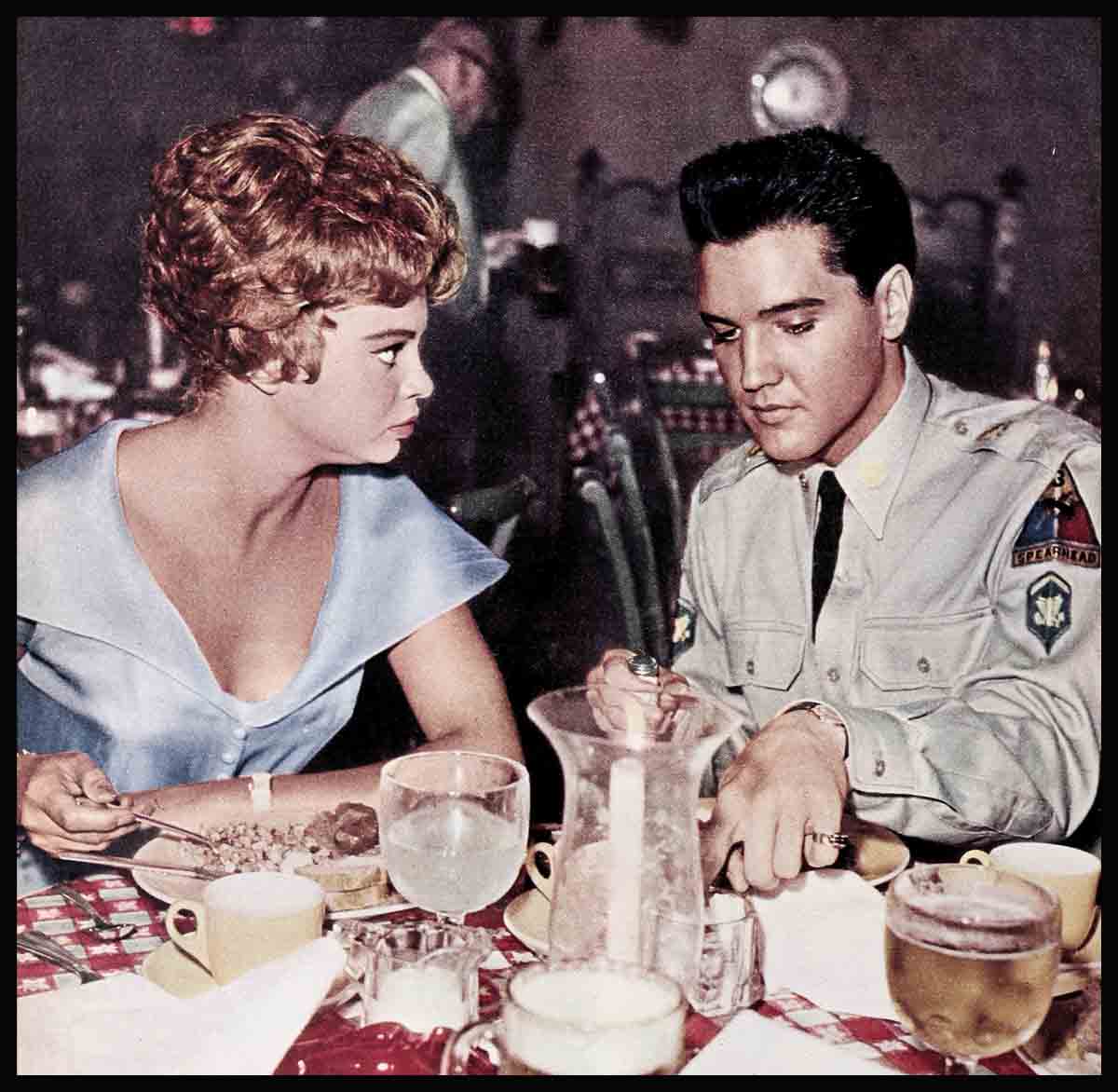
Elvis Presley, What Are You Scared Of?
This time they weren’t going through the back way. The big, black Lincoln Continental rolled up to the front entrance of The Cloister, the famous nitery on Hollywood’s Sunset Strip. Three young men stepped out of the limousine, and then Elvis. He was healthily tanned, handsomely dressed and, at the sight of him, a horde of girl fans set up a happy squealing. In less than half a second, they had him and the car completely surrounded as they clamored for autographs, a look, a smile. And, at first, no one noticed the girl sitting in the back seat. Her auburn hair was neatly done in a French twist with two deep waves falling softly around her pixyish face. Elvis, who had been pushed many feet away from the car, tried desperately to reach his date and escort her into the club. It was nearly ten minutes before Juliet Prowse could emerge from the car. In the sudden silence that fell on the entire street audience, every whisper became a loud comment.
“Oh, it’s Juliet Prowse . . . That’s Frank Sinatra’s girl! What’s she doing with Elvis? . . . Has Elvis gone off his rocker?” The newsy tidbits flew faster than a gossip columnist’s pencil. One little girl in the back of the crowd sighed in complete disgust. “Oh, they’re only doing a picture together!” But her brief comment was lost in the on flowing tide of “juice”!
Juliet, in a crisp green cocktail dress, slid her arm through Elvis’ while he tried to cut a pathway into the club. As he felt her touch, he grasped hold of her arm as though it was the last thing he was going to feel, ever. He looked into her blue eyes as if for reassurance and she looked up at him, a small smile gently curving her lips.
“Maybe we should’ve gone in the back way at that,” he said, but she shook her head. “No, what’s there to be afraid of?”
Inside the club, a line of people waited to be seated. But the maitre d’ immediately directed Elvis and Juliet to a table. The three bodyguards had disappeared.
Juliet and Elvis seemed to have tremendous rapport going between them. They smiled often at each other and held hands under the table. It was the first time anyone had seen Elvis so relaxed. He even tilted his chair back, casual and comfortable.
Photographers’ flash bulbs went off all over the place, but somehow no one went near the Presley table. Which was rather peculiar. Then a flash went off right in his direction, and Elvis immediately jumped to his feet. He called the photographer over to his table, but he did it quietly, causing no commotion. In a firm tone he said, “I told you, no pictures!”
“I didn’t take any,” the photographer insisted. “I was getting a shot of Tony Bennett on stage.”
“Oh, okay.” Elvis settled back in his chair again. Even so, the rest of the evening seemed less relaxed than the beginning, and he looked preoccupied. During the show, he glanced at Juliet often. It was as if he wanted to say, “Juliet, are you the one for me? What we have, can it last?” But each time he tried to say anything a fan would come up to ask for his autograph, and each time he obliged with a smile and a “Thank you.” He signed the last autograph as the show began and, as the lights dimmed, he took Juliet’s hand, twined his fingers with hers. They didn’t say much after that, just stole secret looks and held hands . . .
When they met
Juliet and Elvis had become good friends while they were making “G.I. Blues.” She was a warm girl, with a tremendous capacity for understanding—a girl full of love and empathy. Men came first in her life, always. Perhaps it was her European background that drew Elvis to her. He had been fond of several foreign girls while overseas in the Army—though none of the romances took.
Juliet, of French and English descent, came from South Africa. When Barrie Chase walked out of “Can Can,” Juliet replaced her, which brought her and Sinatra together. She became Frank’s favorite date—but when she got to know Elvis she liked him a lot, too. She told people, “What I like best about Elvis is his gentleness.”
When Frank went off to the Orient, it seemed natural for the two young people to come closer. Often, when they were visiting back and forth in each other’s dressing rooms on the set, choreographer Charlie O’Curran (he’s married to Patti Page) would yell, “Here comes Frank!” Everybody took it as a great joke—until the day Sinatra really did show up on the set. O’Curran had given out his warning, “Here comes Frank,” but by then he’d pulled it so often nobody listened. So Frankie, who arrived with a gift in hand—an expensive string of pearls—found his girl great chums with Elvis. It was a moment of intense strain. “But Frank and Elvis both laughed,” Juliet related later. “A little hysterically—but what counts is, they laughed.”
And now, tonight, Juliet and Elvis were holding hands in public, while Sinatra was in Florida.
The day after their date at the Cloister, Juliet got a call on the set—long distance, from Florida. It was hard to tell if she was pleased or not at the sound of Sinatra’s voice. At first, she seemed elated, then her happy face turned red.
“Whats’ going on?” Frank wanted to know. All those rumors about her and Elvis—were they true? Already word had reached him of last night’s date at The Cloister. And if any pictures of them had been taken, he personally would “rip ’em up.” The word had immediately gone out to his publicity office, and from there to all photographers. Had any pictures been taken? They’d better not!
When Juliet returned to her dressing room, Elvis was waiting for her, concerned about the call. Juliet was apprehensive herself and of two minds. She was free and twenty-one, nobody could tell her what to do and not do! Yet she was Frank’s girl . . . sort of, anyway. He hadn’t asked her to marry him, he hadn’t asked her anything—except to do what he said when he said it. She owed him a lot, and she appreciated it immensely, but how far does appreciation go?
She and Elvis stood staring at each other as if the same thought crossed their minds at the same time—last night on their date and now again! Are we in love? Can we—may we—be in love? And the answer seemed to be up to Elvis.
It was a question many other people had begun asking, and wondering: Are those two in love with each other? And can Elvis stand up to Sinatra? They doubted it. They doubted it for only one reason—they didn’t feel Elvis wanted to stand up to Frank over Juliet. Not because he was afraid—he wasn’t. But because he wasn’t sure that in Juliet, either, he had found the girl he was looking for.
Now, standing by her dressing-room door, none of this was easy to put into words. And before he could speak, the long silence between them was broken by director Norman Taurog, who called both of them into a scene. Elvis looked at Juliet, a pathetic look crossing his face. He couldn’t say anything—perhaps it wasn’t necessary. The look in his eyes said everything.
During his scene he goofed his lines several times. His mind wasn’t with it. What was he thinking of? What was he afraid of?
Hollywood . . . New York . . . the world . . . show business . . . Where did it start? . . . Where did it end? The movie world was a land of make-believe, a world of unreality, without stability, without security. A poor boy from Mississippi had become, almost overnight, Elvis Presley the star.
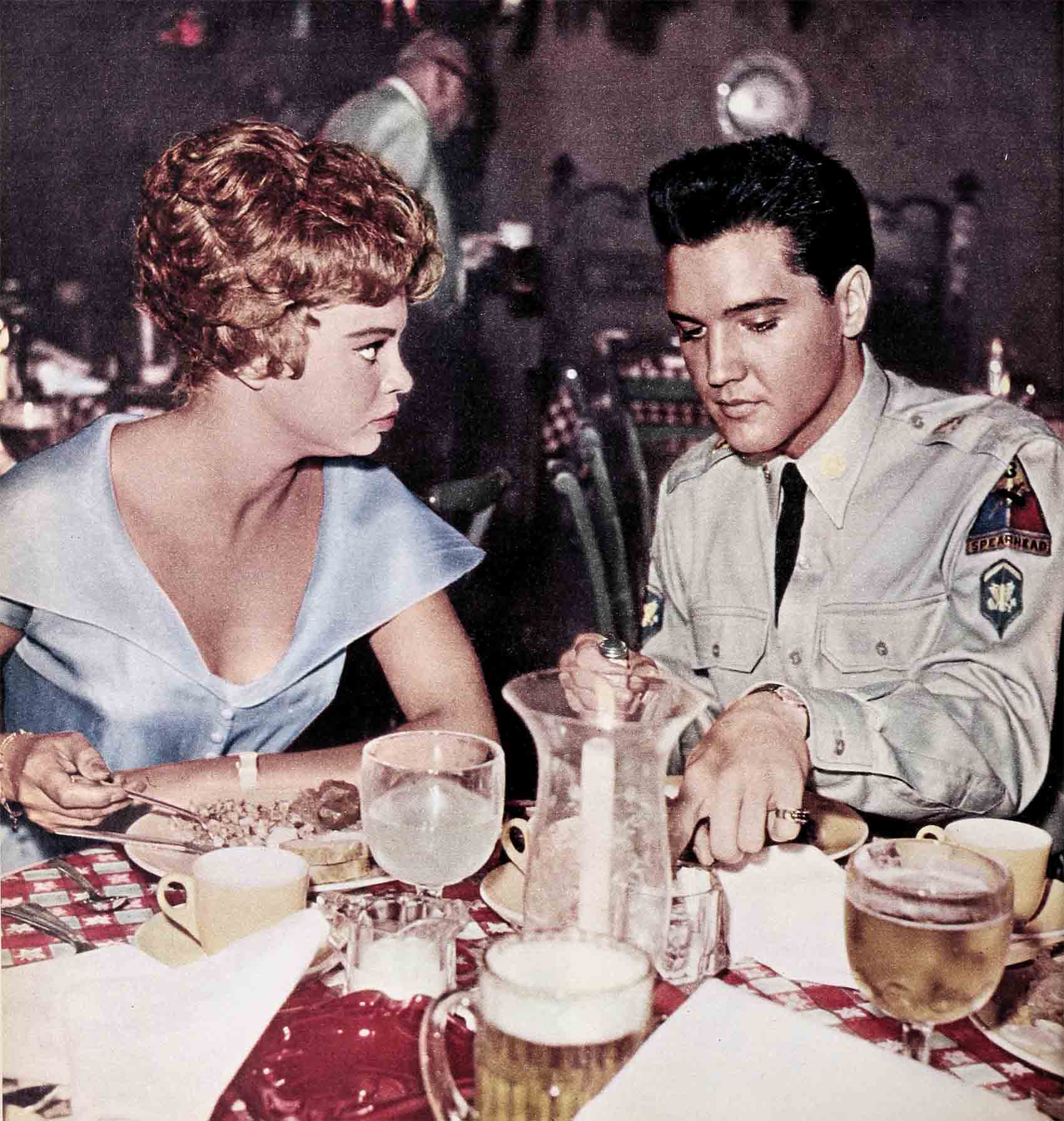
The memory of his mother
Then he found himself in the Army, in a division that was no sissy outfit, it was rough and he liked it. “It was one of the best things that ever happened to me,” he told friends after. “I had been taking too much for granted—all that money and cars and clothes. A man loses his sense of values—or maybe I never had time to get one, it was work, play, and more work. But in the Army I had time to think, and be grateful to the good Lord for all He’d given me.”
When he came out of service, he couldn’t help think some more, and wonder: Would it ever really be the same for him again? Would he still be King? Way up there on top? There are many who say this is what bothers Elvis, this is why he shies away from marriage.
But others say his reasons are very different, that at the heart and core of them is the memory of his mother. They say that no girl has yet matched her image for Elvis. To him she stood for beauty, honesty, truth and sincerity. In a world of make-believe, she was the one reality. And they say that when Elvis does take a wife, she will, in all likelihood, be a sweet, small-town girl like Grace Presley. A “home folks” kind of girl. Recently, explaining why he wouldn’t buy a home in Beverly Hills, but would commute from Memphis to make pictures, Elvis said, “I need to come back home here to keep my perspective. I like to work in Hollywood, but I like to live among ‘just folks.’ ”
Whenever Elvis is in Memphis, he visits his mother’s grave. She is buried in Forest Hill Cemetery, on South Bellevue, the same street he lives on. The cemetery is only a mile north of Graceland, the Presley mansion, and he goes there several times a week.
“Everytime I go in that place, I get depressed,” he has admitted. “It brings back memories and sadness. . . .”
Recently, a New Orleans girl accosted him at the graveside and began making remarks which Elvis thought inappropriate for the occasion. He told her so and she became angry.
A few minutes later, as he was leaving on his motorcycle, she veered her car toward it and ran him off the road near the cemetery gate. But he didn’t prosecute, he let it drop. He must have felt that making a big rumpus over such an un-pleasant incident was no way to honor the memory of the mother he’d always fondly called “my best girl.”
His father’s new wife
Can it be for the same reasons that Elvis has never been known to say anything but kind things of his father’s new wife? It couldn’t have been easy for him to accept the reality of Vernon Presley re-marrying this soon. And it didn’t help too much that Davada (Dee) Stanley, a divorcee with three little boys, was only six years older than her famous stepson. Or that Elvis wasn’t at the wedding—so quiet as to be almost secret—in Alabama.
But Elvis took everything in his stride, and publicly denied any feelings of resentment. He answered questions with a frank chivalry toward his father that was as touching as his devotion to his mother.
“My dad was a good husband and never left my mother’s side for twenty-six years,” he said. “If he has found happiness now, I’m all for him. All the time he was in Germany with me, he was a miserable, unhappy, broken man.
“And Dee, as much as I know about her, is a pretty nice understanding type of person. I don’t really know her all that well, you know. But she treats Daddy with respect, and me, too.
“She realizes that she could never be my mother. I only had one mother and that’s it. There’ll never be another. I talked to Dee about this and so has Daddy. As long as she understands that, we’ll have no trouble.”
And to make sure there was no doubt at all on his stand toward this marriage, he got a few more of his feelings off his chest (to an interviewer from Photoplay).
“We have got letters saying some pretty horrible things about Daddy since this marriage first was planned. But I want to tell the world that he is my father, and all I’ve left in this world. I’ll never go against him or turn on him. He stood by me all those years, he sacrificed things he wanted so I could have clothes and lunch money to go to school.
“I’ll stand by him now—right or wrong!”
Asked how he felt about his three little stepbrothers, Elvis said, “Of course, they won’t be exactly like brothers to me, but I do like kids. I bought them some toys and swings to play with. And we built them a playroom in the enclosed garage.”
He has also denied all rumors that he was remodeling the little caretaker’s house behind Graceland for Vernon and Dee to live in. This is the house formerly occupied by Travis Smith, Elvis’ uncle, who watches the gate.
Elvis said, “That isn’t so. We fixed up the caretaker’s house just so we would have a place to store all of the stuff we brought back from overseas. Dad and his wife will live in the big house with me.”
This, then, is the newly matured Elvis that a girl will have to know and understand if she wonders, is Elvis “scared” of marriage. It is the Elvis who has frankly said in public, “If I was madly in love with anyone, which I’m not, I’d be prepared to risk losing some of my following, teenagers especially, by marrying. But for now, there’s no need.”
No, because Elvis isn’t in love—yet. If anyone prevents the romance between him and Juliet from developing into a real love with marriage in view, it won’t be Frank Sinatra—it will be Elvis himself. : Perhaps Elvis knows that, too. Perhaps he knew it that night at The Cloister. When the show had ended and the house-lights went on, Elvis was deep in thought. “A penny for your thoughts?” Juliet asked. But Elvis just smiled. If only he could tell her what he was afraid of. . . .
THE END
—BY CLAUDINE MONTEL
See Elvis and Juliet in Par.’s “G.I. Blues.” Watch for Elvis in 20th’s “Flaming Heart.”
It is a quote. PHOTOPLAY MAGAZINE NOVEMBER 1960


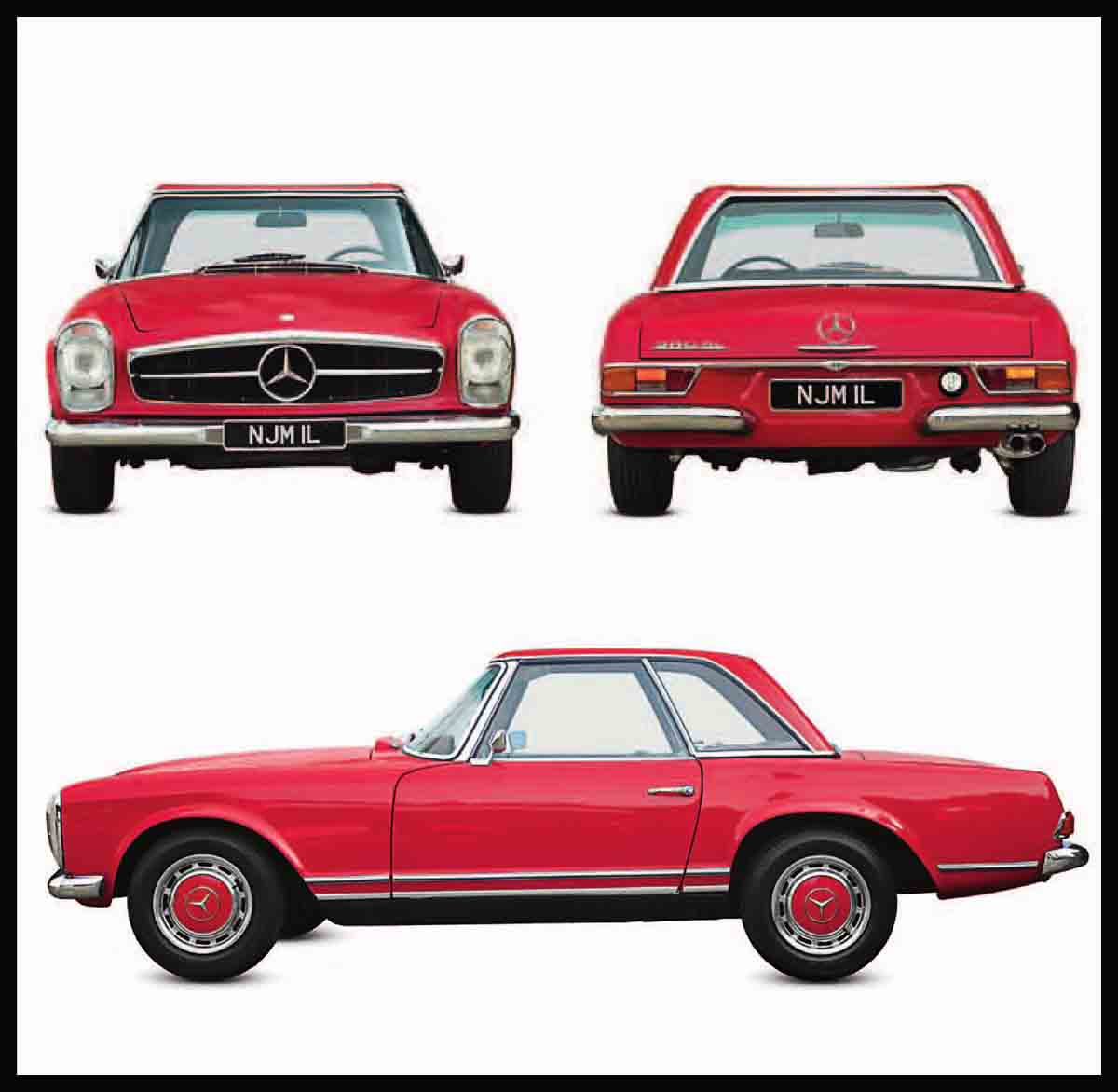
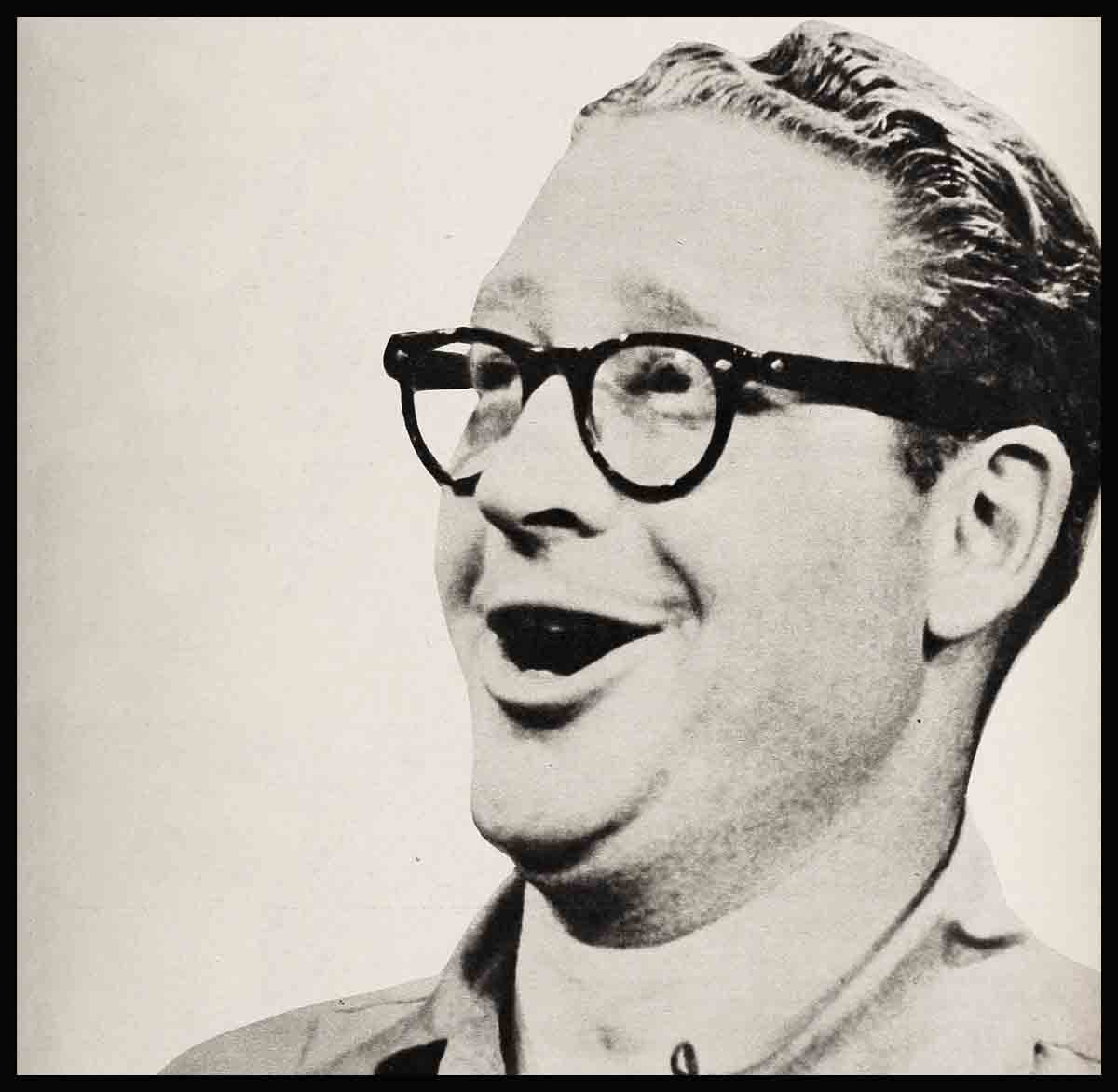
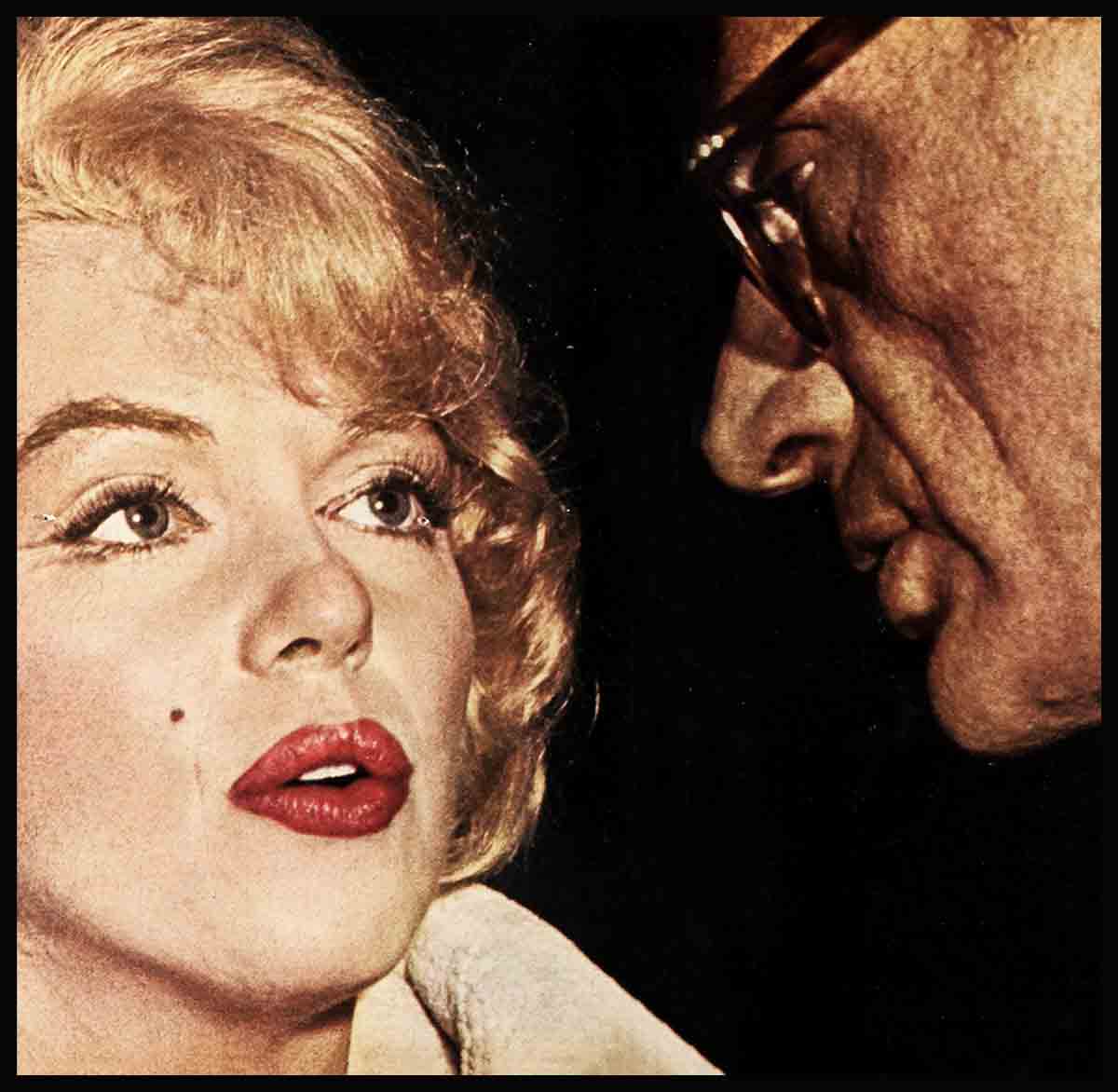
zoritoler imol
24 Nisan 2023Excellent website. Lots of useful information here. I am sending it to some pals and also sharing in delicious. And obviously, thanks for your sweat!
Kathleen Presley
31 Ağustos 2023Elvis has always been afraid of women they scare him he’s not afraid of marriage that’s the only thing he believes in he always said I want a lady not a floozy